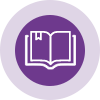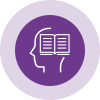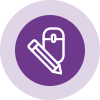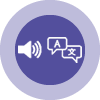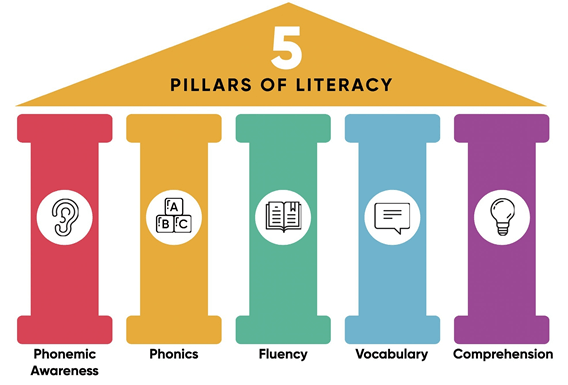Reading for Children & Families with LDs
What are the Skills Needed to be a Good Reader?
There has been a lot of research undertaken during the last few decades that has helped us to understand the skills needed to be a good reader.
In 2000, The National Reading Panel in the U.S. published a report called: Teaching Children to Read: An Evidenced-Based Assessment of the Scientific Research Literature on Reading and its Implications for Reading Instruction.
They determined that to become a good reader, one must develop efficient skills and the 5 Pillars of Reading.
5
PILLERS OF LITERACY
5
PILLERS OF LITERACY

Phonemic Awareness

Phonics

Fluency

Vocabulary

Comprehension
Is Reading Hard?
Are some of these reading skills so challenging that they cause reading difficulties (impact your child’s ability to read and/or understand material that their peers would be able to read easily)? Are they struggling with other literacy skills such as oral language, spelling and writing? All of these literacy skills are inter-related.
- Are some of these reading skills so challenging that they impact your child’s ability to read and/or understand material that their peers would be able to read easily?
- Are they struggling with other literacy skills such as oral language, spelling and writing?
Outlined below are some steps you may take to get extra support and services for your child with a reading disability. The critical message is this: Get Extra Reading & Writing Support Right Away!
Go to the website page Struggling at School to learn more about the process of identifying your child’s reading difficulties and suggestions for how to work with your child’s school to support your child’s learning.
Teachers in grades 1 through 3 will be doing ongoing progress monitoring throughout the school year to determine how students are progressing in their literacy skills. If it is clear that a student is struggling with literacy skills, then the school will likely do a screening or reading assessment to identify the specific areas of need and tailor the reading support accordingly. The classroom teacher can do a reading screening and the learning/literacy specialist would do a more thorough reading assessment. You can also go to a qualified agency or reading specialist to get this initial reading screening done.
As soon as you and/or the school recognize that your child is struggling with literacy skills of oral language, reading, spelling, and/or writing get extra support started right away. The support may come from your child’s school, qualified community agencies or tutors, or possibly a combination of services.
Prevention & Early Intervention: Kindergarten through Grade 3 is a critical developmental stage for emerging readers. If there is an indication that your child is not meeting developmental milestones in reading and writing, do NOT wait until grade 3 or later to address the issues. Get on it right away!
View the article in LEARN MORE – Reading 101; A Guide for Parents. It describes the developmental milestones for typical readers.
Older Struggling Readers: It is never to late to start literacy intervention. Older students can still make gains in their reading and writing, but they will need more intensive and extensive intervention.
School Support for Diverse Learners provides information about how schools support struggling learners. Take a look at the different approaches and talk to your school to learn how they support students struggling with literacy skills such as reading, spelling, and writing.
Tiered Support: Your school may have in place tiered support for students who struggle academically, particularly with literacy skills. Examples of approaches of tiered support is known as ‘Response to Intervention (RTI)’ or ‘Multi-Tiered Systems of Support (MTSS).
If your child continues to struggle with literacy skills such as reading and writing even after receiving extra support and has shown little improvement, then it may be time to get a psycho-educational assessment by an educational psychologist.
A psycho-educational assessment can help determine the cause of your child’s difficulty in reading and other literacy skills. The assessment will determine if your child has a Specific Learning Disorder (SLD) in Reading, other Learning Disabilities, and/or if there are other factors contributing to these challenges. It may also indicate other conditions, such as ADHD. In the report the psychologist will make specific recommendations for supporting your child.
The school district may arrange a free psycho-educational assessment, although there may be a wait period to access an assessment. Or you may choose to pay a psychologist privately for an assessment. About LD – Assessment & Diagnosis explains the process. Selecting a Psychologist gives you suggestions for finding a qualified psychologist.
You do NOT need to wait until your child has a diagnosis of a Learning Disability to start remedial reading. Early Reading Intervention is very important.
If your child is diagnosed with a reading disability, then your child will:
-In Alberta; be given a code of 54: Learning Disability
-Qualify for an Individual Program Plan. Go to Individual Program Plans for more information.
-Through the IPP, be eligible for reading intervention and other school support at your school.
-Be eligible for accommodations in school, including Assistive Technology (such as text-to-speech and speech-to-text software) and extra time to complete assignments or exams
Reading 101 – A Guide for Parents
This guide will give you a better understanding of what it takes to learn to read and how you can help your children grow as readers, writers, and learners!
10 Things You Can Do to Raise a Reader
By Reading Rockets
Parents are a child’s first teacher and there are things you can do every day to share the joy of reading while strengthening your child’s literacy skills.
Reading Disabilities - Definitions & Terms
If your child has received a diagnosis to indicate that they have a Specific Learning Disorder in Reading (DSM-5 assessment) or an Auditory/Language Processing Disorder (LDAC definition), the report will describe the specific subskills of reading your child may struggle with.
For a detailed description of Learning Disabilities definitions and terms, go to the website sections called: About LD Definitions and Terms to Describe LDs.
Dyslexia is the most common type of Learning Disability in Reading.
People with Dyslexia (learning disability in reading) struggle with the foundational skills of phonemic awareness, word identification, and fluency.
That means they struggle with:
- Blending, breaking apart (segmenting) or manipulating the individual sounds within a word
- Making accurate sound/letter associations when reading or spelling
- Reading words accurately and automatically
- Reading fluently, which means at a steady pace and with expression
- They have to put forth extra effort into reading
New Definition of Dyslexia in the U.S. in 2018
In the United States a new law (Public Law 115-391) was passed in 2018 that states:
“The term ‘dyslexia’ means an unexpected difficulty in reading for an individual who has the intelligence to be a much better reader, most commonly caused by a difficulty in the phonological processing (the appreciation of the individual sounds of spoken language), which affects the ability of an individual to speak, read, and spell.” https://dyslexia.yale.edu/advocacy/advocacy-outreach/
In 2002, the International Dyslexia Association defined Dyslexia as: “Dyslexia is a specific learning disability that is neurobiological in origin. It is characterized by difficulties with accurate and/or fluent word recognition and by poor spelling and decoding abilities. These difficulties typically result from a deficit in the phonological component of language that is often unexpected in relation to other cognitive abilities and the provision of effective classroom instruction. Secondary consequences may include problems in reading comprehension and reduced reading experience that can impede growth of vocabulary and background knowledge.” https://dyslexiaida.org
‘‘Dyslexia is very common, affecting 15-20% of the population and representing 80– 90% of all those with learning disabilities. Scientific research shows differences in brain connectivity between dyslexic and typical reading children, providing a neurological basis for why reading fluently is a struggle for those with dyslexia.’’ http://dyslexia.yale.edu/dyslexia/what-is-dyslexia/
IDA Dyslexia Handbook: What Every Family Should Know was developed by the International Dyslexia Association (IDA).
‘In addition to offering valuable information about dyslexia and its characteristics, this handbook provides information on assessments, effective teaching approaches, self-advocacy ideas, and a vast array of resources. The handbook contains information that will be useful throughout a child’s life, from elementary school through college. The degree of difficulty a child with dyslexia has with reading, spelling, and/or speaking varies from person to person due to inherited differences in brain development, as well as the type of teaching the child receives.’
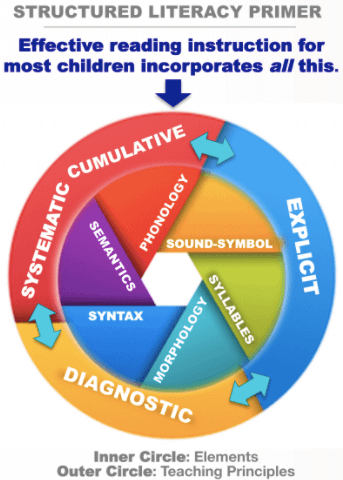
Research on the Science of Reading and Effective Literacy Instruction has proven that instruction needs to be diagnostic and prescriptive, explicit, sequential, cumulative, and systematically teach all of the important components of reading.
Structured Literacy is a term that is becoming well known to describe an evidenced-based approach to teach the literacy skills of oral language, reading, spelling, and writing. It is effective for regular literacy instruction in the classroom and is particularly needed for targeted literacy intervention when working with struggling readers. This is an over-all approach, not a specific program. Evidenced-based reading intervention programs that explicitly and systematically teach students word recognition and comprehension skills will fit under this approach.
Resource: Visit our webpage on Effective Literacy Instruction for Educators.
Visit the International Dyslexia Association (IDA) for more information about Structured Literacy and other topics related to dyslexia and reading.
Disclaimer: The Learning Disabilities & ADHD Network does not support, endorse or recommend any specific method, treatment, product, remedial centre, program, or service provider for people with Learning Disabilities or ADHD. It does, however, endeavour to provide impartial and, to the best of our knowledge, factual information for persons with Learning Disabilities and/or ADHD.

